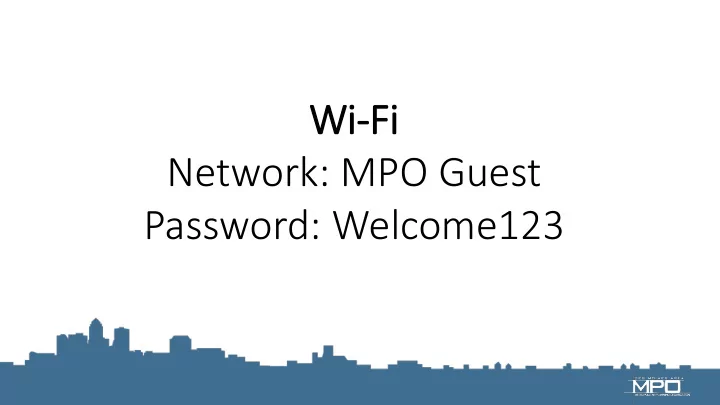

Wi Wi-Fi Fi Network: MPO Guest Password: Welcome123
SMART CITY ROUNDTABLE April 30, 2018
INTRODUCTIONS
Basics to consider SMART CITY OVERVIEW
Smart City Definition Smart Cities use information- communication technology (ICT) to engage citizens, deliver services, and enhance urban systems. Source: American Planning Association, www.planning.org/leadership/agendas/2015/spr/pdfSmartCitiesSustainabilityFinal.pdf
Trends Leading to Smart Cities Source: American Planning Association, www.planning.org/leadership/agendas/2015/spr/pdfSmartCitiesSustainabilityFinal.pdf
Trends Leading to Smart Cities Source: American Planning Association, www.planning.org/leadership/agendas/2015/spr/pdfSmartCitiesSustainabilityFinal.pdf
Trends Leading to Smart Cities Source: American Planning Association, www.planning.org/leadership/agendas/2015/spr/pdfSmartCitiesSustainabilityFinal.pdf
Trends Leading to Smart Cities Source: American Planning Association, www.planning.org/leadership/agendas/2015/spr/pdfSmartCitiesSustainabilityFinal.pdf
Components of Smart Cities Source: American Planning Association, www.planning.org/leadership/agendas/2015/spr/pdfSmartCitiesSustainabilityFinal.pdf
Connected Vehicles Vehicle-to-vehicle
Why are we here? ROUNDTABLE BACKGROUND & PURPOSE
Purpose Prepare the Des Moines area for what’s coming regarding Smart City • Technologies • Exchange ideas among public, private, and non-profit sectors about how technology could impact community development • Identify transportation technologies that should be pursued as the MPO develops its Long-Range Transportation Plan • Reduce socio-economic disparities in the community • Leverage technology to maximize efficient use of tax dollars
Smart card across transportation modes
Smarter Parking
Adaptive Traffic Signals
Intelligent Transportation Systems Master Plan Elements of the Study Central Management Software Traffic Signal hardware Video Observation system (Working with PD, Public Works, Des Moines Public Schools) Traveler Information (Dynamic Message signs / Apps) Example of a Traffic Operations Center Communication system (Working with Network IT group) Overall traffic management strategy Traffic Operation Center Staffing Transportation Goal 8 Flexibility for Smart City Technologies Plan for future changes in transportation demand, technology, and innovation
Intelligent Transportation Systems Master Plan Long Term Goal – Understand how Iowa DOT, DART, and metro communities can manage traffic together Potential functions: Special Events (Concerts, Festivals, I-Cubs Games, State Fair, etc) Construction detour management Traffic Incident Management (w/ DOT) Manage rush hour issues (I-235 ramp Intersections, major arterials, Connect Downtown) Adaptive/Responsive traffic signals Emergency Pre-Emption Transit and Public Works (Plows) Priority Video Observation Safety (PD, DMPS) Data Collection / Performance Measurement
Example: Kansas City, MO • Challenge – Generate economic development, offer basic services more efficiently, enhance citizen experience • Smart City solution – • Free Main Street streetcar line • Free public WiFi • Smart streetlights & sensors • Community kiosks Real time data visualization for public & city leaders •
Example – Columbus, OH • Challenge – High infant mortality rate in certain neighborhoods • Smart City solution – • Automated doctors appoints tied to transit schedules • Smart corridor connecting underserved neighborhoods to jobs • Payment system that include transit fare, taxi vouchers, SNAP, and other services
Columbus Smart City Integrated Data Exchange Sources of Non-Transportation Data From Smart City Project TransportationData Data Sources Trip Planning Dedicated Autonomous Mid-Ohio FoodBank Ohio Department and RoutingApp Short Range Vehicles ofTransportation Communication United Way Electric Vehicle Central Ohio Kiosk ChargingStations Transit Authority Mobileye ColumbusChamber SmartHub RFIDVehicle Mid-OhioRegional SmartPass Hands-On Central Ohio Sensor Planning Commission City of Columbus Department of Health Integrated Data Exchange City ofColumbus Application Programming City ofColumbus The Ohio State Interface (API) and Department of University Software Development Kit (SDK) Technology Columbus City Schools Partnering Cities Columbus Transportation PrivateApp Public Public Private MetropolitanLibrary Networking Developers Agencies Sector Sector Companies(TNC) Metro Parks End-Users of the Information Data Exchange SmartCols-03
Columbus Smart City Enhanced Human Services
What are our challenges & opportunities? GROUP DISCUSSION
Group Discussion • What are the issues we want to focus on from a Smart City perspective? – Who “owns” those issues? – Who else needs to be at the table? – What’s the roundtable’s role? • What further research or information is needed?
Potential Focus Areas Poverty Food access and security Affordable housing Access to health care Parking Changes in commerce/retail Stormwater and water quality
NEXT STEPS
Recommend
More recommend